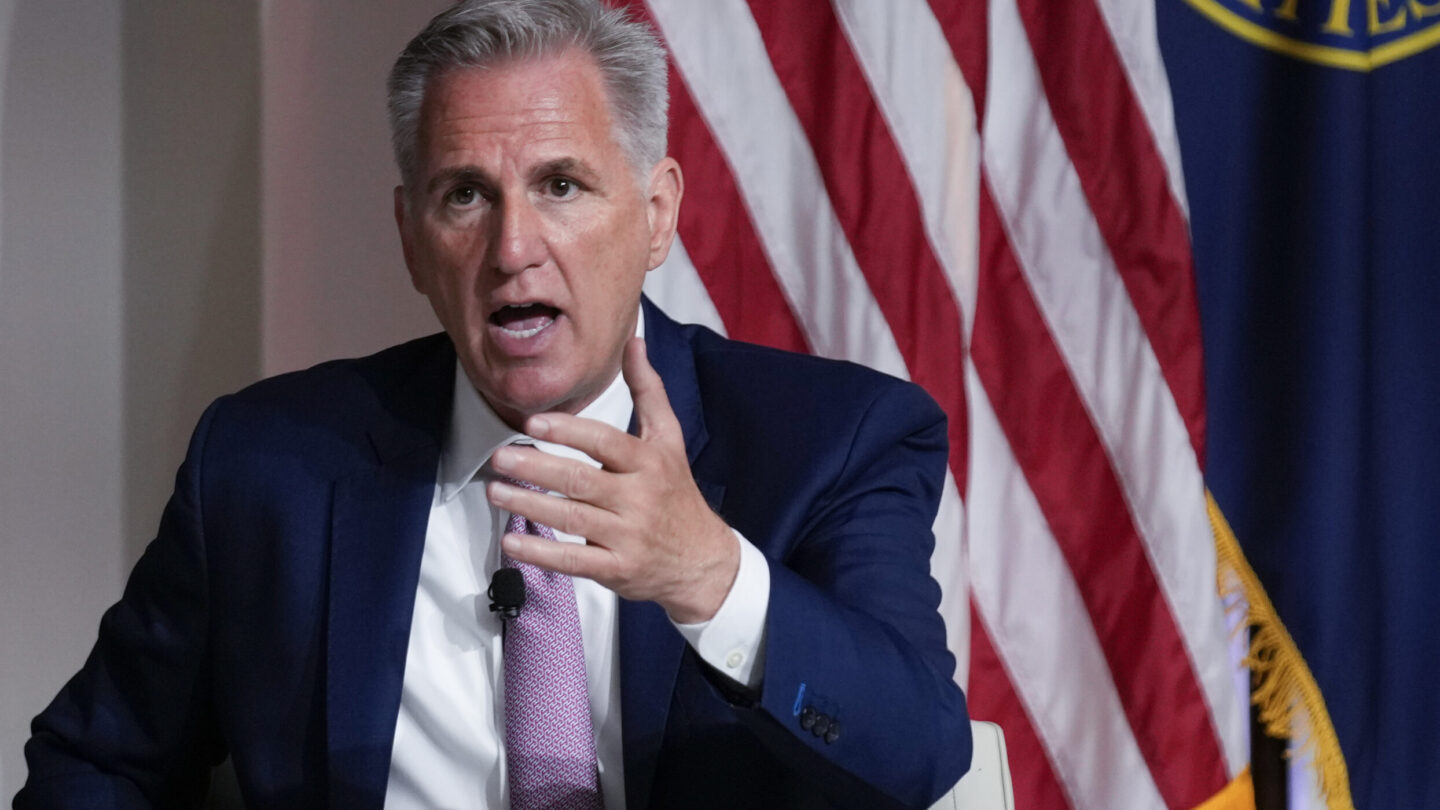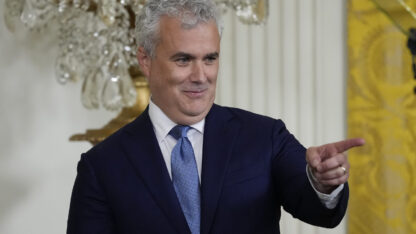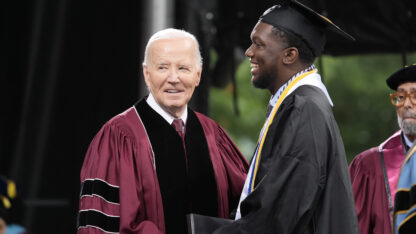McCarthy struggles for debt bill votes, makes late changes

House Speaker Kevin McCarthy pushed ahead Wednesday toward a swift vote on his sweeping debt ceiling package despite a veto threat from the White House, struggling to shore up support even after making post-midnight concessions to Republican holdouts in the slim GOP majority.
Passage of the sprawling 320-page package in the House would be a turnaround for the embattled McCarthy as the chamber’s Republican majority confronts President Joe Biden with demands for spending restrictions and cuts in exchange for approving $1.5 more debt to pay the nation’s bills.
While the president has threatened to veto the Republican bill — which would almost surely die in the Senate anyway — McCarthy is challenging Biden with a GOP plan to kickstart negotiations and prevent a potentially catastrophic federal debt default this summer. The two could hardly be further apart on how to resolve the issue.
“We can vote as early as today on this,” said Majority Leader Steve Scalise after a morning meeting of House Republicans, though no vote was scheduled. “We want to get this done as soon as possible.”
The House launched a noontime debate with lawmakers saying they were expecting a vote later Wednesday, though some Republicans cautioned that a final roll call could still push into Thursday.
From the White House, Communications Director Ben LaBolt said that McCarthy “has cut a deal with the most extreme MAGA elements of his party,” a reference to the Trump-era “Make America Great Again” slogan that has come to represent far-right Republicans.
House Republicans “are selling out hard-working Americans in order to defend their top priority: restoring the Trump tax cuts for the wealthiest and corporations,” LaBolt said in a statement. “Budgets are a statement of values — and House Republicans have made clear who they are fighting for.”
In the rush to bring the package forward, changes were approved at a 2 a.m. session of the House Rules Committee despite earlier repeated insistence by McCarthy and his leadership team that there would be no changes.
Facing a revolt from Midwestern Republicans over doing away with biofuel tax credits that were just signed into law last year by Democrat Biden, GOP House members relented and allowed the tax credits to stay on the books in their bill.
Republicans also agreed to more quickly launch the bolstered work requirements for recipients of government aid, starting in 2024 as proposed by another holdout, Freedom Caucus’ Rep. Matt Gaetz, R-Fla., who has led previous challenges to McCarthy.
Republicans hold a five-seat majority and face several absences this week, leaving McCarthy with almost no votes to spare.
As McCarthy worked to shore up support, some of the most conservative rank-and-file Republican members who have never voted for a debt ceiling increase in their quest to slash spending said they were preparing to do just that, rallying behind the speaker’s strategy to push Biden to the negotiating table.
Leaders were working hard, still short of the final tally needed from their majority.
“This week, we will pass the bill on this floor,” McCarthy told reporters late Tuesday.
Democrats have criticized the package over what Biden calls “wacko” Republican ideas and the “same old trickle-down” economics favored by the GOP, now “only worse.” In the Senate, where Democrats have the majority, they say the Republican plan it is dead on arrival.
The top Democrat on the House Rules panel, Rep. Jim McGovern, derided the “midnight seance” that produced the final package, particularly “cruelly” imposing stricter work requirements on recipients of food stamps and other government aid.
“Taking food away from people is a rotten thing to do,” said McGovern of Massachusetts in the early hours of Wednesday morning.
Still, McCarthy is using the exercise as a political strategy to shake up the debate. Biden has so far refused to engage with House Republicans on what the White House calls “hostage taking” over the debt ceiling. McCarthy hopes House passage will kickstart talks with Democrats — if he can round up enough votes.
It’s a first big test for the president and the Republican speaker, coming at a time of increased political anxiety about the need to raise the federal debt limit, now at $31 trillion, to keep paying the country’s already accrued debts.
The Treasury Department is taking “extraordinary measures” to pay the bills, but funding is expected to run out this summer. Economists and experts warn that even the threat of a federal debt default would send shockwaves through the economy.
In exchange for raising the debt limit by $1.5 trillion into 2024, the bill would rollback federal spending to fiscal 2022 levels and cap future spending increases at 1% a year for the next decade.
The package would also impose tougher work requirements on recipients of food stamps and government aid, halt Biden’s plans to forgive up to $20,000 in student loans and end the landmark renewable energy tax breaks Biden signed into law last year. It would tack on a sweeping Republican bill to boost oil, gas and coal production.
A nonpartisan Congressional Budget Office analysis released Tuesday showed the Republican plan would reduce federal deficits by $4.8 trillion over the decade if the proposed changes were enacted into law.
Several Republicans from the party’s right wing, eager for even stricter spending cuts, said this bill was at least a starting point as they prepared to vote for McCarthy’s strategy and bolster his hand in talks with Biden.
Rep. Ralph Norman, R-S.C., a member of the Freedom Caucus, said he “wanted double” the deficit savings contained in the bill, but would vote for it.
“I agreed to vote for it because it starts the ball, it gets us in the arena to solve the debt problem,” Norman said. He said, “We’ll pass it today.”
Freshman Rep. Derrick Van Orden, R-Wis., said: “It’s our obligation to get Speaker McCarthy to the table.”
Others though, remained noncommittal or flat out no’s.
Rep, Tim Burchett, R-Tenn., said Republican leaders were a no-show for a planned meeting and don’t have his support. The nearly $32 trillion in debt, “that’s my major concern,” he said.
In the Senate, leaders were watching and waiting for the House action.
Senate Majority Leader Chuck Schumer said House passage of the legislation would be a “wasted effort” and that McCarthy should come to the table with Democrats to pass a straightforward bill without GOP priorities and avoid default.







